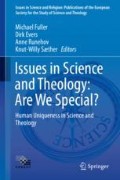Abstract
The laws of physics not only allow for, but also in a sense enforce, the origin of structures, even of such complex ones as living organisms. However, they mercilessly maintain a balance: growth must remain in agreement with the second law of thermodynamics – everything has to tend to the thermodynamical equilibrium, that is to say thermal death. Even the most stable structures must finally surrender to statistical chaos. Physical evil, suffering, death, decay, find their raison d’etre in the structure of the Universe and are the price for the very possibility of life. But what about moral evil, for instance when a human being, making use of a physical evil, destroys another human being? Moral evil appeared in the history of the Universe together with the ability to choose between good and evil. Before that there existed physical evil but the Universe was morally innocent. The existence of moral evil does not find its raison d’être in physical laws. It transcends physics. Among the various attempts to answer Leibniz’s question ‘Why is there something rather than nothing?’ there is one which is especially rich in consequences. It claims that something exists because it is good. This is an echo of Plato’s ‘the good and right … hold and bring things together’ (Phaedo). In this perspective, existence and goodness are interchangeable (ens et bonum convertuntur). If goodness justifies existence then it also justifies rationality, since everything that exists is implacably rational. It follows that evil is irrational and as such it cannot be rationally justified. This gap in rationality is tolerated since the Universe with evil and freedom (to make evil) is supposedly better than a Universe without evil and without freedom.
Access this chapter
Tax calculation will be finalised at checkout
Purchases are for personal use only
Notes
- 1.
This book is a collection of classical and less classical texts related to the Leibniz question with ample comments by the editors. The present essay is the fruit of the careful reading of this book, and the ideas presented in it in many respects go back to it.
- 2.
In fact, it was much more than an ironic remark. In 1755 a huge earthquake devastated Lisbon. ‘He [Voltaire] lampooned in his novel Candide: crawling among the ruins, Candide, terrified … weltering in blood and trembling with fear and confusion … said to himself “If this is the best of all possible worlds, what can the rest be like?”’ (Woolhouse 2010: 143).
- 3.
All quotations in the present section come from Leibniz’s essay On the Ultimate Origination of Things as quoted by Leslie and Kuhn (2013: 119–122).
Bibliography
Barrow, J. D., & Tipler, F. J. (1986). The anthropic cosmological principle. Oxford: Oxford University Press.
Hartle, J., & Hawking, S. W. (1983). Wave function of the universe. Physical Review, D28, 2960–2875.
Leslie, J., & Kuhn, R. L. (Eds.). (2013). The mystery of existence. Why is there anything at all? Malden/Oxford: Wiley-Blackwell.
Penrose, R. (1989). The emperor’s new mind. New York/Oxford: Oxford University Press.
Tegmark, M. (2014). Our mathematical universe. New York: Knopf.
Tryon, E. (1973). Is the universe a vacuum fluctuation? Nature, 246, 396–397.
Woolhouse, R. (2010). Starting with Leibniz. London/New York: Continuum.
Author information
Authors and Affiliations
Editor information
Editors and Affiliations
Rights and permissions
Copyright information
© 2017 Springer International Publishing AG
About this chapter
Cite this chapter
Heller, M. (2017). How May We Justify the History of the Universe?. In: Fuller, M., Evers, D., Runehov, A., Sæther, KW. (eds) Issues in Science and Theology: Are We Special?. Issues in Science and Religion: Publications of the European Society for the Study of Science and Theology, vol 4. Springer, Cham. https://doi.org/10.1007/978-3-319-62124-1_16
Download citation
DOI: https://doi.org/10.1007/978-3-319-62124-1_16
Published:
Publisher Name: Springer, Cham
Print ISBN: 978-3-319-62123-4
Online ISBN: 978-3-319-62124-1
eBook Packages: Religion and PhilosophyPhilosophy and Religion (R0)

